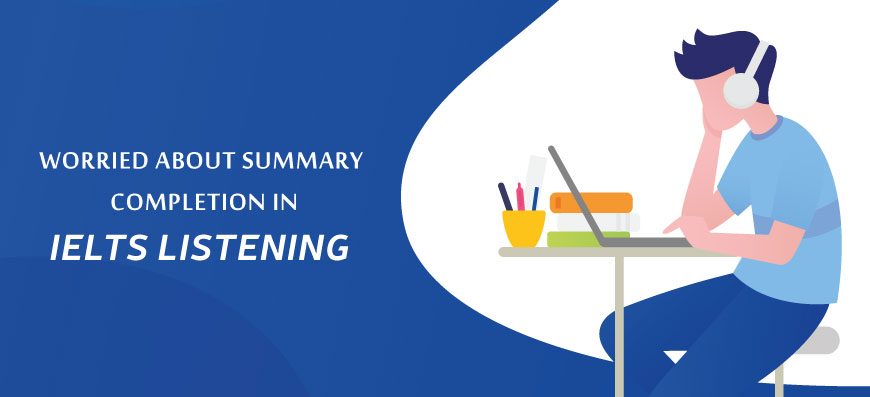Worried About Summary Completion In IELTS Listening

Looking at a summary of the text and then thinking about the conversation audio that is to be followed can be too overwhelming for many students. If you are preparing for IELTS Listening tests and deep inside silently praying to avoid summary completion question types, I have both good and bad news.
The bad news is that you are very much likely to see a summary completion question type on the D-day. The good news, however, is that by apt practice and making use of some tips and suggestions you can easily handle summary completion question types. So let's get started….
Read the summary and try to generate a generic idea
Before the audio conversation starts playing out you get ample time to have a look at the questions. While you may be prattling on underlining keywords for most question types, summary completion text is mostly paraphrased. This means you need to understand the context of the question over the use of words.
Use the information to predict what you may hear
Try getting a general idea about the type of conversation you are more likely to hear. You may be amused that just by getting an idea; you may grasp so much more information from the audio. The summary of the conversation can give out the whole just of the conversation easily. In fact, a summary completion question type can sometimes reveal a lot more about the likely audio conversation. This makes you not only get summary completion answers but also handle other questions with ease.
Think in terms of synonyms and paraphrases
A summary completion content is of two lines or a short paragraph will never use the same text that you are likely to hear in the audio. Always think on the lines of synonyms and paraphrases when checking summary completion questions.
For example, a summary completion question may be as follows:
"…… energy helps in creating little carbon footprint."
The audio in the conversation may be on the lines that renewable energy sources are environmentally friendly compared to traditional use of charcoal as an electricity source. So while you may get the answer as renewable energy, the content of the summary completion question types is not a part of the actual conversation you may be hearing. Predicating the information from the question type can help you understand some talk about energy, carbon, pollution. These clues can make you listen attentively to the audio and increase your chances of getting the right answers.
Practice summary completion tests extensively
A common denominator for apt handling of all question types is to have firsthand information by indulging in ample practice. Summary completion is no difficult and if you practice such question types, the higher are your chances to tackle them with ease in your exam. Check out FourModules which is a good resource to get extensive IELTS Listening tests. The good news about handling summary completion question types is that you can get all the answers correct by proper practice and making use of these tips as suggested above.
The bad news is that you are very much likely to see a summary completion question type on the D-day. The good news, however, is that by apt practice and making use of some tips and suggestions you can easily handle summary completion question types. So let's get started….
Read the summary and try to generate a generic idea
Before the audio conversation starts playing out you get ample time to have a look at the questions. While you may be prattling on underlining keywords for most question types, summary completion text is mostly paraphrased. This means you need to understand the context of the question over the use of words.
Use the information to predict what you may hear
Try getting a general idea about the type of conversation you are more likely to hear. You may be amused that just by getting an idea; you may grasp so much more information from the audio. The summary of the conversation can give out the whole just of the conversation easily. In fact, a summary completion question type can sometimes reveal a lot more about the likely audio conversation. This makes you not only get summary completion answers but also handle other questions with ease.
Think in terms of synonyms and paraphrases
A summary completion content is of two lines or a short paragraph will never use the same text that you are likely to hear in the audio. Always think on the lines of synonyms and paraphrases when checking summary completion questions.
For example, a summary completion question may be as follows:
"…… energy helps in creating little carbon footprint."
The audio in the conversation may be on the lines that renewable energy sources are environmentally friendly compared to traditional use of charcoal as an electricity source. So while you may get the answer as renewable energy, the content of the summary completion question types is not a part of the actual conversation you may be hearing. Predicating the information from the question type can help you understand some talk about energy, carbon, pollution. These clues can make you listen attentively to the audio and increase your chances of getting the right answers.
Practice summary completion tests extensively
A common denominator for apt handling of all question types is to have firsthand information by indulging in ample practice. Summary completion is no difficult and if you practice such question types, the higher are your chances to tackle them with ease in your exam. Check out FourModules which is a good resource to get extensive IELTS Listening tests. The good news about handling summary completion question types is that you can get all the answers correct by proper practice and making use of these tips as suggested above.
Posted
September 10, 2019





